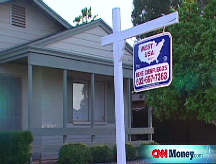Casinos crap out
Trump Entertainment has filed for bankruptcy but analysts don't think other big gaming companies will follow suit. Still, the stocks are a risky bet.

 |
| The gaming industry has been hit hard during the global recession...and Las Vegas-based casino companies Wynn Resorts, MGM Mirage and Las Vegas Sands have really taken it on the chin. |
NEW YORK (CNNMoney.com) -- It looks like the house doesn't always win, after all.
Trump Entertainment, the Atlantic City-based casino operator, filed for Chapter 11 bankruptcy Tuesday. The news follows the resignation on Friday of the company's titular chairman (the Donald, of course). The stock plunged more than 35% Tuesday, and now trades at about 15 cents a share.
But Trump (TRMP) isn't the only gaming company facing hard times. The casino industry has turned out to be hardly recession proof.
Shares of the three companies that dominate Sin City -- Wynn Resorts (WYNN), MGM Mirage (MGM, Fortune 500) and Las Vegas Sands (LVS) -- have each fallen more than 40% this year. Wynn's stock has lost three-quarters of its value in the past 12 months while MGM and Las Vegas Sands have each nosedived more than 90%.
What gives? Aren't the odds stacked in the favor of casino companies?
Yes. Problem is that people have to get to the casinos in order to lose money. In the face of this severe global recession, travel to Las Vegas, for example, took a big hit.
According to figures from the Las Vegas Convention and Visitors Authority, total visitor volume declined 4.4% last year while the number of people who came to town for conventions fell 5%
Making matters worse, the number of hotel rooms in the city rose 5.7% while the average daily room rate fell 10%. And since the Las Vegas housing market has been among the hardest hit in the nation in terms of declining prices and foreclosures, the locals clearly are holding back on hitting the tables and slots as well.
All that led to a 10% decline in gaming revenues for Las Vegas casinos in 2008. (This year might not be much better either, especially if big banks receiving TARP money stop flying loan officers to Las Vegas for "annual recognition events.")
Compounding problems for the casino industry's Big Three, Wynn, MGM and Las Vegas Sands also have spent heavily on properties in Macau, a resort town in China. That and other new projects have left each company with mammoth debt loads.
So could more casino bankruptcies, pardon the awful pun, be in the cards?
"It's not likely, but it's possible," said Dennis Forst, an analyst with Keybanc Capital Markets. "A lot of casino companies are struggling with a high level of debt right now and declining cash flows. It's a pretty ugly combination."
Forst said he's not recommending investing in any of the casino companies with a big presence in Las Vegas or Atlantic City right now. But he said some smaller regional gaming firms are holding up better and might be worth a look for a patient, long-term investor.
Two he highlights are Penn National Gaming (PENN), which operates casinos and horse racing tracks that have slot machines, and Ameristar Casinos (ASCA), which despite being based in Las Vegas, owns no casinos in Sin City.
Penn National Gaming has a big presence in Indiana and Illinois, for example, while Ameristar owns casinos in Missouri, Iowa and Mississippi.
"For gaming companies not dependent on Las Vegas, that's a plus right now. Ones in the Midwest are holding up better," Forst said.
Lawrence Klatzkin, an analyst with Jefferies & Co., also likes Penn National and Ameristar. But he thinks that Vegas' Big Three are bargains right now because bankruptcy fears are overblown.
Klatzkin points out that Wynn has about a billion dollars in cash on hand and little debt maturing soon. He adds that while MGM and Las Vegas Sands have more pressing cash concerns, the two companies are working to sell assets.
"I believe these stocks are oversold. Wynn, Las Vegas Sands and MGM are trading as if these companies are closing and I don't think that's the case," he said.
Again, this is not to say that any casino operators will do well in the near-term. Keep in mind, Penn National and Ameristar are merely holding up better than their bigger rivals. They are both still expected to report a decrease in profits in 2009.
As long as the economy remains mired in this recession, consumers are likely to hold back on taking big vacations that involve gambling. That makes any of the stocks in the group about as risky a short-term bet as putting all your money on one number in roulette.
But Trump Entertainment may not set up a wave of more casino bankruptcies. The industry is hurting...but it's not dead.
Update: I'll be darned. Speaking of bankruptcy, Sirius XM (SIRI) wound up inking a deal with John Malone's Liberty Media (LINTA) to keep the satellite radio giant from filing Chapter 11. Liberty has agreed to lend Sirius $530 million in exchange for a 40% equity stake.
I was skeptical that Sirius would find a white knight. And it will be interesting to see how Malone and Sirius CEO Mel Karmazin, who has clashed with fellow moguls before, get along. But for more about what readers have to say about Sirius, check out our video section later Tuesday for a video edition of the Buzz. ![]()


